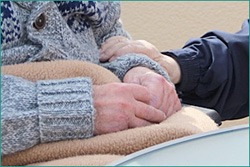Speak up!
If you've written a blog, wish to share a story, or have an idea that you believe would help those visiting the End With Care website, please send it along. If fitting, we'll add your voice to End With Care.
I've got an ideaAn Introduction to Home Care Services
Posted on August 5, 2021
 Many older Americans are choosing to stay at home and age in place, rather than move to an assisted living facility or a nursing home. Many are also choosing to die at home, rather than in hospitals. Thankfully, there are numerous home care services available to assist the elderly as they age in place, and through their end of life journey.
Many older Americans are choosing to stay at home and age in place, rather than move to an assisted living facility or a nursing home. Many are also choosing to die at home, rather than in hospitals. Thankfully, there are numerous home care services available to assist the elderly as they age in place, and through their end of life journey.
Companion Care and Personal Care
Companion Care is a resource for generally healthy elderly adults who want to remain independent at home. Senior companions assist with day-to-day activities that make the senior’s life easier, such as cleaning around the house, running errands,  picking up medications, bringing a senior to a doctor’s appointment, grocery shopping, and meal prepping. Senior companions might also sit down and have a conversation with the senior, or help schedule social events to keep them from feeling isolated. Due to the nature of this work, senior companions do not need to be medically trained, and they can either be paid or be volunteers.
picking up medications, bringing a senior to a doctor’s appointment, grocery shopping, and meal prepping. Senior companions might also sit down and have a conversation with the senior, or help schedule social events to keep them from feeling isolated. Due to the nature of this work, senior companions do not need to be medically trained, and they can either be paid or be volunteers.
For seniors who need additional hands-on support, personal care is a great option. Personal care (sometimes called private duty care) is meant for individuals with chronic health conditions or difficulties with mobility and coordination. Personal caregivers assist with activities of daily living, such as grooming, dressing, and bathing.
Respite Care
About 40 million Americans provide family caregiving services for a loved one. Caregiving for a loved one can be rewarding, but it can also be draining. Respite care allows family caregivers to take a break, rest, and recuperate while respite caregivers look after their loved one and help with daily activities. Unlike companion care or personal care, respite care is usually provided on a short term or temporary basis. Family caregivers may arrange for respite caregivers to come in once a month or once a week so they can take some time for self-cares.
Home Hospice Care
Choosing to die at home may allow  patients to stay in a familiar, comfortable setting, but there may be additional planning required to give them the support they need. Patients with terminal illnesses can receive home hospice care, in which physicians, nurses, and home-health aides visit the patient’s home on a regular basis. These hospice providers offer medical care that will maintain or improve the quality of life of the dying patient to make their final days as comfortable as possible.
patients to stay in a familiar, comfortable setting, but there may be additional planning required to give them the support they need. Patients with terminal illnesses can receive home hospice care, in which physicians, nurses, and home-health aides visit the patient’s home on a regular basis. These hospice providers offer medical care that will maintain or improve the quality of life of the dying patient to make their final days as comfortable as possible.
If you are looking for home care services in Massachusetts, we encourage you to use our End of Life Care Resource Directory to find the right provider for you or your loved one. To assist in locating resources outside of Massachusetts, see Visiting Angels or Care.com.


